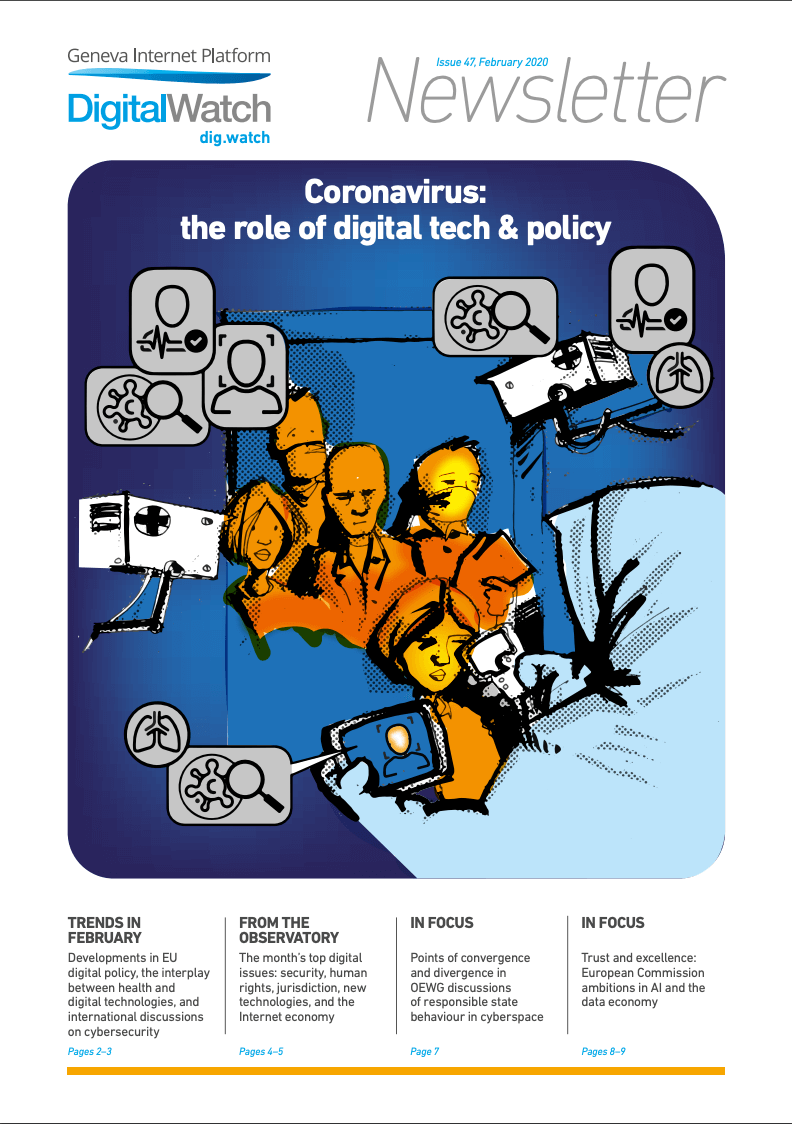
DiploNews – Issue 390 – 4 March 2020
Upcoming study opportunities
May 2020 online courses
Our next course sessions start on 4 May 2020. Register now to reserve your place in these popular courses:
Bilateral Diplomacy
- Diplomacy of Small States
- E-Diplomacy
- Artificial Intelligence: Technology, Governance, and Policy Frameworks
Apply by 30 March 2020 for Diplo certificate courses. For further information or to apply, click on the titles of the courses above or visit our courses webpage.
Malta scholarships
Thanks to support from the government of Malta, partial scholarships are available for applicants from developing countries to attend upcoming Diplo online courses. These scholarships cover 30%–60% of course fees and can be applied to most online courses in 2020. Browse our course catalogue and contact us at admissions@diplomacy.edu for further information. You can also sign up for our courses mailing list to be informed about upcoming courses.
Upcoming events
The Road to Bern via Geneva – Dialogue two: on data protection
On Friday 13th March, the Geneva Internet Platform and partners are co-organising the second dialogue in the series The Road to Bern via Geneva. The central theme will be: Protecting data against vulnerabilities: Questions of trust, security, and privacy of data.
The discussion – co-organised by the World Intellectual Property Organisation (WIPO) and the International Committee of the Red Cross (ICRC) – will address the issues of the practices, needs, and challenges for protecting data; with a look ahead to new actors and approaches. Participants will discuss concrete proposals to be presented at the UN World Data Forum (WDF), and will consider Geneva’s role when it comes to data protection.
The dialogue will also be live-streamed (more details to follow).
The report of the first event, held on 19 February, is available here.
Data 2025 – Conference
On 19 March, Dr Jovan Kurbalija, founding director of DiploFoundation and the head of the Geneva Internet Platform, will speak on Internet governance at the Data 2025 – Conference.
The conference, held in the context of the Road to Bern, and organised in collaboration with C4DT (EPFL), will discuss what data is, based on technical and economic realities. It will start with the present, but look forward to the opportunities and challenges that new technologies will bring for the year 2025.
 Publications
Publications
In our latest issue of the Digital Watch Newsletter, we discuss the main developments in digital policy that took place during February.
We analyse the role of digital tech and policy in the context of the coronavirus outbreak; the European Commission’s ambitions for the EU to achieve excellence in AI and the data economy; the latest OEWG discussions on responsible state behaviour in cyberspace; and, much more.
Latest digital policy trends
Digital and environment
The lines between the physical and digital worlds are blurring. Rapid digitalisation is changing the natural environment. It is changing the way we observe, understand, and interact with our ecosystems. Without a doubt, it is also changing the ways we communicate with each other and the actions that we take on environmental issues.
Read more on the dedicated Digital Watch page.
Recent events
The European Commission’s plans for shaping Europe’s digital future, the interplay between health and digital technologies, and cybersecurity in international discussions were among the main digital policy trends in February 2020.
Check out the recording and summary of the February Internet governance briefing.
What’s been happening in Diplo’s blogosphere?
Keep an eye out on Diplo’s blog, where we just launched a three-part blog series on artificial intelligence (AI)!
The introductory post, by DiploFoundation’s Marília Maciel, explains how three texts from our alumni attending the Artificial Intelligence: Technology, Governance, and Policy Frameworks course were chosen for their outstanding contribution.
In the first blog in the series, ‘A future inevitable’, Abhilash Babu Vinayak questions whether our generation is trading convenience for freedom, and how AI, in particular, may affect our humanity and the core values that have guided mankind.
Throughout the post he uses ‘The Matrix’ trilogy as a time reference to show the vertiginous speed of change brought by technology in the last decades. ‘The Wachowskis warned us about this two decades ago’ he says.
We would love to hear your opinion about these blog posts! The comment section is at the end of each blog.
Survey about Internet governance capacity building in Africa
If you are involved in Internet-related discussions in Africa, we would like to invite you to take part in an online survey designed to collect information for a research conducted under the framework of the Policy and Regulatory Initiative for Digital Africa (PRIDA) project. PRIDA is a joint initiative of the European Commission and the African Union Commission. The goal of the research is to identify the key elements that would enhance the sustainability of Internet governance capacity building in Africa. The survey takes about 10 minutes to complete, and can be filled in English or French.






